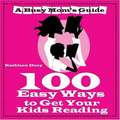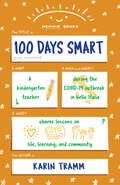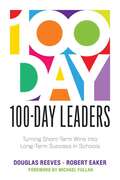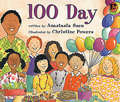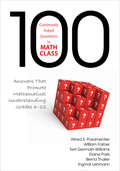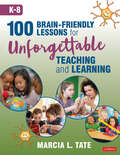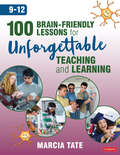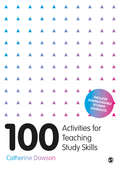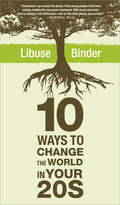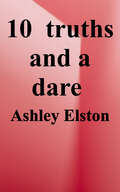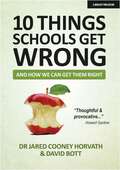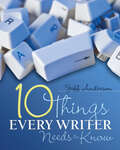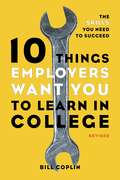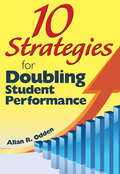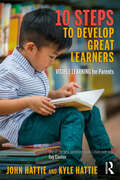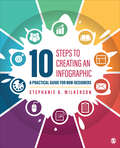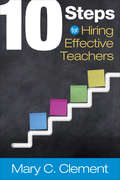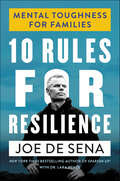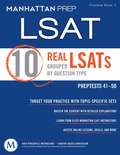- Table View
- List View
100 Easy Ways to Get Your Kids Reading: A Busy Mom's Guide
by Kathleen Duey Jacob DubiPart how-to, part scrapbook, this parenting guide helps turn the grueling task of learning to read into an everyday pleasure. Taking into account a family's busy schedule, these activities and suggestions make reading fun whenever and wherever--turning short car trips and even breakfasts into opportunities to read. Parents are encouraged to create a reader-friendly environment at home by setting aside space for a reading comfort zone and time for a family reading group, and incorporating professional storytelling tips that make each read-aloud experience one no child wants to miss. Scrapbook and journal space transforms this parenting tool into a cherished keepsake by allowing parents to track their child's progress, record favorite books, and note accomplishments.
100 Days Smart: A kindergarten teacher shares lessons on life, learning, and community during the COVID-19 outbreak in bella Italia
by Karin TrammKarin Tramm’s kindergarten class at DoDEA Vicenza Elementary School on Caserma Ederle Army Base, Italy, was counting up to a magic day—the 100th day of school—when students would be 100 days smart!“Mrs. Tramm, is that the last day of school?” a child asked."Goodness no, there are a lot of numbers bigger than one hundred,” Mrs. Tramm explained, “and we will be in school for many more days after the hundredth day.”But then, on February 21, 2020, the 100th day of school, COVID-19 changed everything. From empty classrooms to kindergarten in the kitchen, teachers, parents, and students navigated uncharted waters as their world locked down in the epicenter of the Italian outbreak. For the next 100 days, residents of Vicenza learned to find joy in simplicity, country living, and community.In diary form, 100 Days Smart highlights their resilience, recognizing and remembering the fears and frustrations, humor and humanity of shared experiences on a new path forward.
100-Day Leaders: Turning Short-Term Wins Into Long-Term Success in Schools (A 100-Day Action Plan for Meaningful School Improvement)
by Douglas Reeves Robert EakerWithin 100 days, schools have dramatically increased student achievement, transformed faculty morale and school culture, reduced discipline issues, and much more. Begin leading focused, meaningful change in your own school with the support of 100-Day Leaders by Douglas Reeves and Robert Eaker. Using this book to guide your school improvement plan, you will learn how to achieve a series of short-term wins that combine to form long-term success.
100 Day
by Anastasia Suen Christine Powers<p>A class of kindergarten children celebrate the 100th day of school. <p>Guided Reading: C; Interest Level: Grades 1 - 1; Reading Level: Grades 1 - 1; Themes: Comparing/Classifying/Measuring, Counting Money/Everyday Math, Classroom Activities, Multi-ethnic interest, Games/Toys, Education, Cultural Diversity, Childhood Experiences and Memories, Beginning Concepts, Realistic Fiction, Collaboration
100 Commonly Asked Questions in Math Class: Answers That Promote Mathematical Understanding, Grades 6-12
by Alfred S. Posamentier William L. Farber Terri L. Germain-Williams Elaine S. Paris Bernd Thaller Ingmar H. Lehmann100 ways to get students hooked on math! That one question got you stumped? Or maybe you have the answer, but it’s not all that compelling. Al Posamentier and his coauthors to the rescue with this handy reference containing fun answers to students’100 most frequently asked math questions. Even if you already have the answers, Al’s explanations are certain to keep kids hooked. The big benefits? You’ll discover high-interest ways to Teach to the Common Core’s math content standards Promote inquiry and process in mathematical thinking Build procedural skills and conceptual understanding Encourage flexibility in problem solving Emphasize efficient test-taking strategies
100 Brain-Friendly Lessons for Unforgettable Teaching and Learning (K-8)
by Marcia L. TateUse research- and brain-based teaching to engage students and maximize learning Lessons should be memorable and engaging. When they are, student achievement increases, behavior problems decrease, and teaching and learning are fun! In 100 Brain-Friendly Lessons for Unforgettable Teaching and Learning K-8, best-selling author and renowned educator and consultant Marcia Tate takes her bestselling Worksheets Don’t Grow Dendrites one step further by providing teachers with ready-to-use lesson plans that take advantage of the way that students really learn. Readers will find 100 cross-curricular sample lessons from each of the four major content areas Plans designed around the most frequently-taught objectives Lessons educators can immediately adapt 20 brain compatible, research-based instructional strategies Questions that teachers should ask and answer when planning lessons Guidance on building relationships with students to maximize learning
100 Brain-Friendly Lessons for Unforgettable Teaching and Learning (K-8)
by Marcia L. TateUse research- and brain-based teaching to engage students and maximize learning Lessons should be memorable and engaging. When they are, student achievement increases, behavior problems decrease, and teaching and learning are fun! In 100 Brain-Friendly Lessons for Unforgettable Teaching and Learning K-8, best-selling author and renowned educator and consultant Marcia Tate takes her bestselling Worksheets Don’t Grow Dendrites one step further by providing teachers with ready-to-use lesson plans that take advantage of the way that students really learn. Readers will find 100 cross-curricular sample lessons from each of the four major content areas Plans designed around the most frequently-taught objectives Lessons educators can immediately adapt 20 brain compatible, research-based instructional strategies Questions that teachers should ask and answer when planning lessons Guidance on building relationships with students to maximize learning
100 Brain-Friendly Lessons for Unforgettable Teaching and Learning (9-12)
by Marcia L. TateUse research- and brain-based teaching to engage students and maximize learning Lessons should be memorable and engaging. When they are, student achievement increases, behavior problems decrease, and teaching and learning are fun! In 100 Brain-Friendly Lessons for Unforgettable Teaching and Learning 9-12, best-selling author and renowned educator and consultant Marcia Tate takes her bestselling Worksheets Don’t Grow Dendrites one step further by providing teachers with ready-to-use lesson plans that take advantage of the way that students really learn. Readers will find 100 cross-curricular sample lessons from each of the four major content areas Plans designed around the most frequently-taught objectives Lessons educators can immediately adapt 20 brain compatible, research-based instructional strategies Questions that teachers should ask and answer when planning lessons Guidance on building relationships with students to maximize learning
100 Brain-Friendly Lessons for Unforgettable Teaching and Learning (9-12)
by Marcia L. TateUse research- and brain-based teaching to engage students and maximize learning Lessons should be memorable and engaging. When they are, student achievement increases, behavior problems decrease, and teaching and learning are fun! In 100 Brain-Friendly Lessons for Unforgettable Teaching and Learning 9-12, best-selling author and renowned educator and consultant Marcia Tate takes her bestselling Worksheets Don’t Grow Dendrites one step further by providing teachers with ready-to-use lesson plans that take advantage of the way that students really learn. Readers will find 100 cross-curricular sample lessons from each of the four major content areas Plans designed around the most frequently-taught objectives Lessons educators can immediately adapt 20 brain compatible, research-based instructional strategies Questions that teachers should ask and answer when planning lessons Guidance on building relationships with students to maximize learning
100 Activities for Teaching Study Skills
by Dr Catherine Dawson100 Activities for Teaching Study Skills is a sourcebook of activities for study skills tutors, teachers and support staff. This practical, user-friendly guide is designed to complement your existing study skills materials, and provide innovative and imaginative ways for you to motivate and engage your students. Activities include: Study preparation and time management Reading, writing and listening Independent study and group-work Dissertations, reports and projects Critical and creative thinking Revision, examinations and tests. All activities contain clear guidance about the purpose, level and type of activity, along with a range of discussion notes that signpost key issues and research insights. Students are encouraged to reflect on and develop their study skills, while connecting them to subject content and the process of learning, so that they become more motivated, enhance their learning and increase their chances of success.
100 Activities for Teaching Study Skills
by Dr Catherine Dawson100 Activities for Teaching Study Skills is a sourcebook of activities for study skills tutors, teachers and support staff. This practical, user-friendly guide is designed to complement your existing study skills materials, and provide innovative and imaginative ways for you to motivate and engage your students. Activities include: Study preparation and time management Reading, writing and listening Independent study and group-work Dissertations, reports and projects Critical and creative thinking Revision, examinations and tests. All activities contain clear guidance about the purpose, level and type of activity, along with a range of discussion notes that signpost key issues and research insights. Students are encouraged to reflect on and develop their study skills, while connecting them to subject content and the process of learning, so that they become more motivated, enhance their learning and increase their chances of success.
10 Ways to Change the World in Your 20S
by Libuse BinderWHAT KIND OF WORLD DO YOU WANT TO LIVE IN? Throwing a party. Preparing a meal. Sending an email. These are things you do all the time. How can they really make a difference? Ten Ways to Change the World in Your Twenties shows how to transform these everyday activities into world-changing events: Throw a party with a purpose. Prepare a sustainable meal. Send an email to your representative. An inspiring collection of ideas that can make the world a better place, this book taps into the potential of an energetic, influential generation and lights the path to shaping tomorrow by: Digging into what you love Volunteering in ways big and small Supporting political actions that reflect your values Leading an eco-active lifestyle Simplifying and reducing your footprint Using your buying power to encourage better business practices Eating well locally Hosting a party with a purpose Exploring the world through environmentally responsible travel Turning your passion into a vocation With a rating scale based on the time, money, and lifestyle impact required, and peppered with true tales of twentysomethings who've made an impact, Ten Ways to Change the World in Your Twenties provides resources and opportunities for you to use your talents to help create a history we can all be proud of. *** "Everywhere I go around the planet, I find young people, fresh from college, leading the new green movement. With savvy and heart, they're making a real difference-and as this book shows, you can too!" Bill McKibben 350. org
10 Truths and a Dare
by Ashley ElstonIt's Senior Party Week, that magical in-between time after classes have ended but before graduation, chock-full of gimmicky theme parties, last-minute bonding, and family traditions. Olivia couldn't be more ready. Class salutatorian and confident in her future at LSU, she's poised to sail through to the next phase of her life. But when the tiny hiccup of an unsigned P.E. form puts Olivia in danger of not graduating at all, she has one week to set things straight without tipping off her big, nosy extended family. Volunteering at a local golf tournament should do it, but since Olivia's mom equipped her phone with a tracking app, there'll be no hiding the fact that she's at the golf course instead of all the graduation parties happening at the same time. Unless, that is, she can convince the Fab Four--her ride-or-die cousins and best friends Sophie, Charlie, and Wes--to trade phones with her and go through the motions of playing Olivia for the week. Sure, Olivia's sudden "passion" for golf is met with some suspicion. And sure, her grasp of the rules is a little shaky. And yes, okay, a very cute, very off-limits boy keeps popping up in her orbit. But she is focused! She has a schedule and a plan! Nothing can possibly go wrong . . . right?
10 Things Schools Get Wrong (And How We Can Get Them Right)
by David Bott Jared Cooney HorvathWhat counterintuitive lessons can we learn from the meteoric rise of Mindset Theory in education? Why have computers so overwhelmingly failed to become the academic panacea many expected them to be? How can the simple act of assigning grades drive student narcissism and damage teacher professionalism?In this book, brain and behavioural research is combined with respected philosophy in order to place ten widely accepted yet rarely examined aspects of education under the microscope. - Teacher Expertise- Evidence-Based Practice- Grading- Homework- Mindset- 21st Century Skills- Computers- Rewards- Daily Organization- FunctionThis book aims to inspire teachers, leaders, and parents to question many commonly held beliefs and empower them to re-think the role of modern schooling.
10 Things Schools Get Wrong (And How We Can Get Them Right)
by David Bott Jared Cooney HorvathWhat counterintuitive lessons can we learn from the meteoric rise of Mindset Theory in education? Why have computers so overwhelmingly failed to become the academic panacea many expected them to be? How can the simple act of assigning grades drive student narcissism and damage teacher professionalism?In this book, brain and behavioural research is combined with respected philosophy in order to place ten widely accepted yet rarely examined aspects of education under the microscope. - Teacher Expertise- Evidence-Based Practice- Grading- Homework- Mindset- 21st Century Skills- Computers- Rewards- Daily Organization- FunctionThis book aims to inspire teachers, leaders, and parents to question many commonly held beliefs and empower them to re-think the role of modern schooling.
10 Things Every Writer Needs to Know
by Jeff AndersonWhether writing a blog entry or a high-stakes test essay, fiction or nonfiction, short story or argumentation, students need to know certain things in order to write effectively. In 10 Things Every Writer Needs to Know, Jeff Anderson focuses on developing the concepts and application of ten essential aspects of good writing—motion, models, focus, detail, form, frames, cohesion, energy, words, and clutter. Throughout the book, Jeff provides dozens of model texts, both fiction and nonfiction, that bring alive the ten things every writer needs to know. By analyzing strong mentor texts, young writers learn what is possible and experiment with the strategies professional writers use. Students explore, discover, and apply what makes good writing work. Jeff dedicates a chapter to each of the ten things every writer needs to know and provides mini-lessons, mentor texts, writing process strategies, and classroom tips that will motivate students to confidently and competently take on any writing task. With standardized tests and Common Core Curriculum influencing classrooms nationwide, educators must stay true to what works in writing instruction. 10 Things Every Writer Needs to Know keeps teachers on track—encouraging, discovering, inspiring, reminding, and improving writing through conversation, inquiry, and the support of good writing behaviors.
10 Things Employers Want You to Learn in College, Revised: The Skills You Need to Succeed
by Bill CoplinA handy, straightforward guide that teaches students how to acquire marketable job skills and real-world know-how before they graduate—revised and updated for today’s economic and academic landscapes. Award-winning college professor and adviser Bill Coplin lays down the essential skills students need to survive and succeed in today’s job market, based on his extensive interviews with employers, recruiters, HR specialists, and employed college grads. Going beyond test scores and GPAs, Coplin teaches students how to maximize their college experience by focusing on ten crucial skill groups: Work Ethic, Physical Performance, Speaking, Writing, Teamwork, Influencing People, Research, Number Crunching, Critical Thinking, and Problem Solving. 10 Things Employers Want You to Learn in Collegegives students the tools they need to prepare during their undergraduate years to impress potential employers, land a higher-paying job, and start on the road to career security and satisfaction.
10 Strategies for Doubling Student Performance
by Dr Allan R. Odden[header tag]Research-based strategies for turning around low-performing schools!With case studies and tools, this companion book to Doubling Student Performance expands on ten research-based strategies for driving significant, measurable gains in student achievement.
10 Steps to Develop Great Learners: Visible Learning for Parents
by John Hattie Kyle HattieWhat can concerned parents and carers do to ensure their children, of all ages, develop great learning habits which will help them achieve their maximum at school and in life? This is probably one of the most important questions any parent can ask and now John Hattie, one of the most respected and renowned Education researchers in the world draws on his globally famous Visible Learning research to provide some answers. Writing this book with his own son Kyle, himself a respected teacher, the Hatties offer a 10-step plan to nurturing curiosity and intellectual ambition and providing a home environment that encourages and values learning. These simple steps based on the strongest of research evidence and packed full of practical advice can be followed by any parent or carer to support and enhance learning and maximize the potential of their children. Areas covered include: Communicating effectively with teachers Being the ‘first learner’ and demonstrating openness to new ideas and thinking Choosing the right school for your child Promoting the ‘language of learning’ Having appropriately high expectations and understanding the power of feedback Anyone concerned about the education and development of our children should read this book. For parents it is an essential guide that could make a vital difference to your child's life. For schools, school leaders and education authorities this is a book you should be encouraging every parent to read to support learning and maximize opportunities for all.
10 Steps to Creating an Infographic: A Practical Guide for Non-designers
by Stephanie B. WilkersonThis book provides step-by-step guidance for developing high-quality infographics. Practical in its approach, 10 Steps to Creating an Infographic: A Practical Guide for Non-designers outlines a user-friendly process for developing infographics with a clearly defined purpose and powerful message. The book’s "how-to" approach makes infographic creation accessible for anyone who doesn’t have a background in graphic design or a budget for a graphic designer. Author Stephanie B. Wilkerson breaks down the complex task into a series of steps and models each step through a book-long example of the evolution of an infographic. Through this, and other examples presented throughout the book, readers will learn about infographic best practices and tips, as well guidance for avoiding design pitfalls.
10 Steps to Creating an Infographic: A Practical Guide for Non-designers
by Stephanie WilkersonThis book provides step-by-step guidance for developing high-quality infographics. Practical in its approach, 10 Steps to Creating an Infographic: A Practical Guide for Non-designers outlines a user-friendly process for developing infographics with a clearly defined purpose and powerful message. The book’s "how-to" approach makes infographic creation accessible for anyone who doesn’t have a background in graphic design or a budget for a graphic designer. Author Stephanie B. Wilkerson breaks down the complex task into a series of steps and models each step through a book-long example of the evolution of an infographic. Through this, and other examples presented throughout the book, readers will learn about infographic best practices and tips, as well guidance for avoiding design pitfalls.
10 Steps for Hiring Effective Teachers
by Dr Mary C. ClementThe quick-read, step-by-step guide to hiring outstanding teachers! Whether you are new to teacher hiring or ready for a fresh approach, this invaluable guide helps you select the best possible candidates. Mary Clement, a nationally-awarded expert on teacher hiring, presents proven strategies for identifying high-performing teachers. Readers will learn: Ten best practices that address every stage of hiring, from recruitment through interviewing to final negotiations Key techniques and sample questions for Behavior-Based Interviewing—the interviewing approach that predicts on-the-job performance Guidance on legally-sensitive interview questions How to involve teacher peers in interviewing and mentoring new hires
10 Steps for Hiring Effective Teachers
by Dr Mary C. ClementThe quick-read, step-by-step guide to hiring outstanding teachers! Whether you are new to teacher hiring or ready for a fresh approach, this invaluable guide helps you select the best possible candidates. Mary Clement, a nationally-awarded expert on teacher hiring, presents proven strategies for identifying high-performing teachers. Readers will learn: Ten best practices that address every stage of hiring, from recruitment through interviewing to final negotiations Key techniques and sample questions for Behavior-Based Interviewing—the interviewing approach that predicts on-the-job performance Guidance on legally-sensitive interview questions How to involve teacher peers in interviewing and mentoring new hires
10 Rules for Resilience: Mental Toughness for Families
by Joe De Sena Lara Pence10 principles for leading your family to True Resilience, from the bestselling author of Spartan Up and the CEO/founder of SpartanJoe De Sena has spent his life running toward challenge and discomfort. Why? Because how we react to challenging situations defines us and our families. The only tools we have as humans to survive the many peaks and valleys of a full life are preparedness, health, leadership, and most importantly, resilience. Why do so many parents struggle to finish things we start, delay gratification, and protect our health—and why do our kids continue to struggle in every facet of life? Because we haven’t showed them a path to resilience, and we haven’t fought for it ourselves. In 10 Rules for Resilience Joe De Sena outlines his 10 principles for leading your family to True Resilience, a term he uses for a body and mind that have been carved out of hard work, challenge, and failure. It takes True Resilience to approach overwhelming situations with calm and confidence, to not get rattled, anxious, or angry, and even to embrace failure, setbacks, and redirections.
10 Real LSATs Grouped by Question Type
by Manhattan PrepDesigned as a study aid for the students of Manhattan Prep's elite LSAT prep classes, 10 Real LSATs Grouped by Question Type provides students with an opportunity for targeted practice. Cut from Practice Tests 41-50, this book allows students to hone their skills on specific question types in Logical Reasoning, Logic Games, and Reading Comprehension, including Assumptions, Inferences, Binary Grouping, and more. In-depth explanations for every question are written by Manhattan Prep's expert LSAT instructors and feature hand-drawn diagrams that allow students to get inside the mind of a 99th percentile scorer.By providing a means for targeted training, 10 Real LSATs Grouped by Question Type is an invaluable study tool, enabling students to get acclimated to the nuances of the exam and achieve a higher level of mastery on every question the LSAT has to offer!
